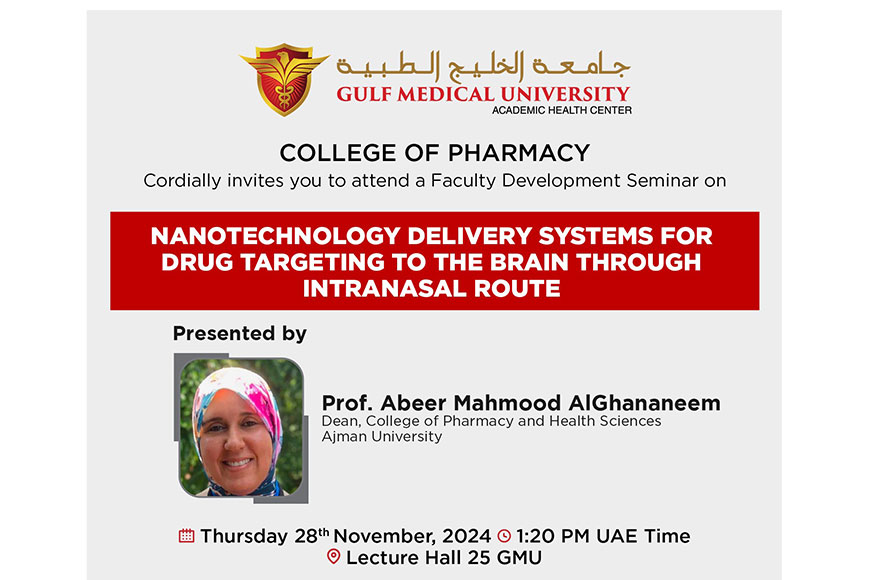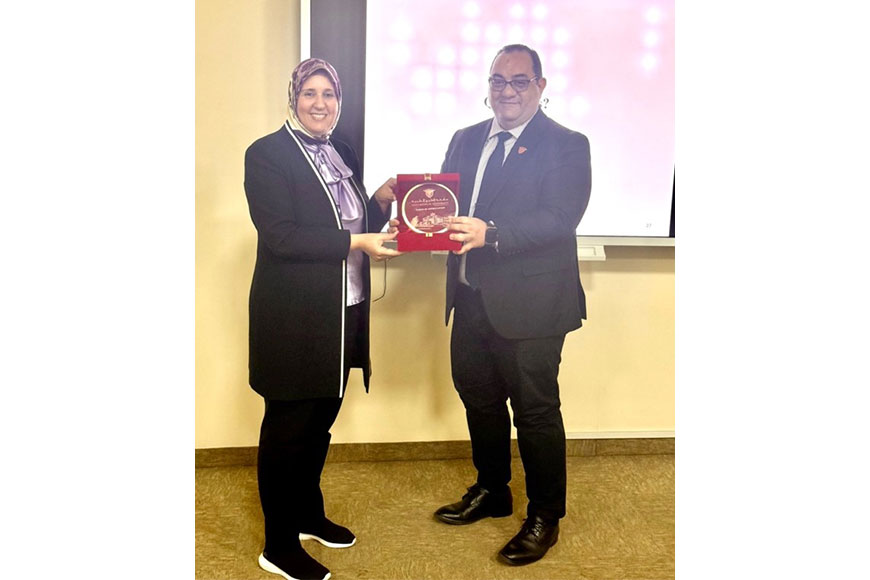On Thursday, October 28, 2024, the College of Pharmacy at Gulf Medical University welcomed Prof. Abeer Mahmood AlGhananeem, Dean of the College of Pharmacy and Health Sciences at Ajman University, for a research seminar. Faculty members and students from the Master’s in Drug Discovery and Development program attended the session.

Prof. AlGhananeem, a distinguished expert in pharmaceutical sciences, presented her seminar titled “Nanotechnology Delivery Systems for Drug Targeting to the Brain through Intranasal Route.”. Prof. AlGhananeem had successful academic-industrial research collaboration initiatives that culminate into several USA FDA approved drugs such as Revonto™ injection, Lucemyra™ tablets, Subsys™ sublingual spray, Valchor gel, and several dietary supplement products such as Luciplex, Noctoplex, Addivance, Calmposure, and GoodSprouts topical pediatrics products and cosmetic pharmaceutical preparations. Also, Prof. AlGhananeem is an Academic Leadership Fellow of the American Association of Colleges of Pharmacy (AACP), Past Chair and Commissioner at the Accreditation Council for Pharmacy Education (ACPE) International Services Program, and Global Lead for Quality Assurance at the International Pharmaceutical Federation (FIP).

During the seminar, Prof. AlGhananeem discussed the advantages and challenges of utilizing nanotechnology for intranasal drug delivery. She presented her findings on the pharmacokinetics of a tetrahydrocannabinol (THC) intranasal spray, which demonstrated significantly higher bioavailability compared to other administration methods.
She further elaborated on the benefits of dihydroergotamine (DHE) intranasal chitosan nanoparticles, showcasing an increase in maximum plasma concentration (Cmax) and overall bioavailability, making it a promising alternative for migraine treatment.
Prof. AlGhananeem also highlighted the central nervous system (CNS) as a challenging sanctuary site for HIV, emphasizing her research on didanosine (DDI), an HIV reverse transcriptase inhibitor, encapsulated in chitosan nanoparticles. This nanoformulation enhanced the onset, Tmax, Cmax, and bioavailability of DDI compared to its solution form. She compared the pharmacokinetics of DDI in its solution form, nanoformulation administered intranasally, and intravenously, demonstrating the superiority of the nanoparticle approach for CNS drug delivery.
Prof. AlGhananeem also shed light on her work with olanzapine-loaded chitosan nanoparticles that showed enhanced systemic absorption compared to standard intranasal solutions.
Looking ahead, Prof. AlGhananeem stressed the importance of precision medicine in intranasal drug delivery, focusing on tailoring treatments to individual patients’ needs for more effective and targeted therapies.
The seminar concluded with an engaging discussion on the future applications of intranasal drug delivery, exploring its potential for treating a range of conditions through enhanced bioavailability and precise targeting.

